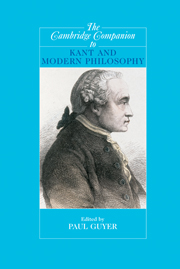Book contents
- Frontmatter
- Introduction: The starry heavens and the moral law
- 1 “A Priori”
- 2 Kant on the perception of space (and time)
- 3 Kant’s philosophy of mathematics
- 4 Kant on a priori concepts: The metaphysical deduction of the categories
- 5 Kant’s philosophy of the cognitive mind
- 6 Kant’s proofs of substance and causation
- 7 Kant and transcendental arguments
- 8 The critique of metaphysics: The structure and fate of Kant’s dialectic
- 9 Philosophy of natural science
- 10 The supreme principle of morality
- 11 Kant on freedom of the will
- 12 Mine and thine? The Kantian state
- 13 Kant on sex and marriage right
- 14 Kant’s theory of peace
- 15 Kant’s conception of virtue
- 16 Kant’s ambitions in the third Critique
- 17 Moral faith and the highest good
- 18 Kant’s critical philosophy and its reception - the first five years (1781-1786)
- Bibliography
- Index
6 - Kant’s proofs of substance and causation
Published online by Cambridge University Press: 28 March 2007
- Frontmatter
- Introduction: The starry heavens and the moral law
- 1 “A Priori”
- 2 Kant on the perception of space (and time)
- 3 Kant’s philosophy of mathematics
- 4 Kant on a priori concepts: The metaphysical deduction of the categories
- 5 Kant’s philosophy of the cognitive mind
- 6 Kant’s proofs of substance and causation
- 7 Kant and transcendental arguments
- 8 The critique of metaphysics: The structure and fate of Kant’s dialectic
- 9 Philosophy of natural science
- 10 The supreme principle of morality
- 11 Kant on freedom of the will
- 12 Mine and thine? The Kantian state
- 13 Kant on sex and marriage right
- 14 Kant’s theory of peace
- 15 Kant’s conception of virtue
- 16 Kant’s ambitions in the third Critique
- 17 Moral faith and the highest good
- 18 Kant’s critical philosophy and its reception - the first five years (1781-1786)
- Bibliography
- Index
Summary
PRELIMINARY REMARKS
Kant's views on the nature of causation and substance do not depend on any compromise between or any combination of rationalism and empiricism, but on what he calls a “third thing,” the pure intuition of time, which is completely missing in both rationalism and empiricism.
For Kant the empiricist position on causation fails to establish the necessary connection between events, that one event “arises out of” or “emerges” from another. Besides constant conjunction in experience, Kant grants the empiricist “empirical” universality through induction (Pure Reason, A 91/B 124), or completely universal generalization. This universality, however, implies only that all events of a certain type are followed by events of a second type - but not that any particular event of the first type forces, produces, or necessarily yields an event of the second type. The regularity theory that defines causation in terms of subsumption under inductively allowable universal generalization simply fails to account for the connection in singular causation. For Kant the rationalist position on causation is that the causal connection is a connection of inference in the intellect, namely, that the existence of a second event can be inferred or deduced from a first event (A 243/B 301). But now for Kant this idea of inferring existence makes no sense apart from causation (one event's producing or yielding another) and so cannot explain it.
- Type
- Chapter
- Information
- The Cambridge Companion to Kant and Modern Philosophy , pp. 203 - 237Publisher: Cambridge University PressPrint publication year: 2006
- 2
- Cited by



